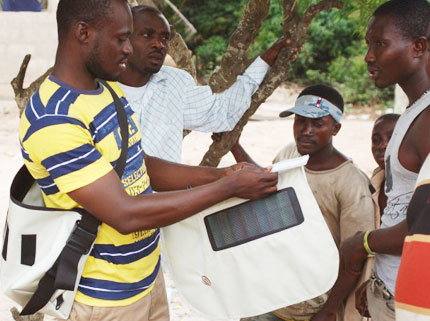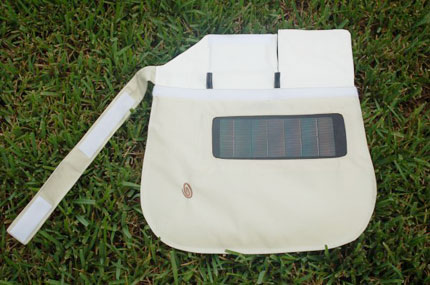
FLAP bag prototype examined in Ghana last August at the time of Maker Faire. Photos: Erik Hersman, from Afrigadget
A shoulder bag conceived to help nomadic people in urbanizing places, by providing them with an integrated solar-powered light and the potential to charge electronic devices, shows how iteration can prepare a bold design for the market. It also shows how a powerful idea can be tripped up (though hardly vanquished) by obstacles on the path to mass production.
The bag, known as FLAP (for Flexible Light and Power), is a group effort. It brings together Timbuk2, the Bay Area maker of messenger bags from recycled fabric, and Sheila Kennedy, a Boston-based architect and materials researcher who has been working on delivering ready electricity in Africa. Kennedy’s Portable Light Project involving illuminated textiles elucidated the bag's form, Timbuk2 provided the canvas and the folks behind PopTech – a conference that makes Camden, Maine, a hub of idealistic design every October — paid for the electronics that make the bulb glow.
The collaboration drew design-blog buzz before PopTech convened last month, not least because Timbuk2 encouraged field-testing. “People are interested in hacking this bag,” Marie-Claire Meisels, PopTech’s spokesperson, said recently. And why shouldn’t they? Its virtues are intuitive and its weaknesses are knotty. It does many things yet costs too much to produce many copies. And it’s not clear how to reconcile its promise with its limits.
PopTech’s FLAP product manager, Cordelia Newlin de Rojas, said the conference gave the product its vital elements. “We discussed using 4-watt or 2-watt bags, and ended up doing a combination,” she explained. “We’re in discussion about how to make the 2-watt bag power cell phones at a faster rate.” The aim is a product that works as container, light source and communications vehicle for emergencies or start-up businesses while retaining a soft canvas shape.

FLAP bag's flap with flexible solar panel
Therein we find its genius and its constraint. The flexible solar panel is easy to rip out and wrap with Velcro around an arm, so that it shines at night while the user travels. “You can expose the LED so it's a tracking light when you're walking and biking,” de Rojas points out. But its power reflects its context: as de Rojas explains, the bag’s USB can only charge up in sunlight because the producers’ target markets don’t offer enough juice on the electric grid to make charging at home feasible in most places.
The bag’s sweet spot for marketing is its weak spot for scaling: the “flex panel” that makes it so versatile has never been produced in mass quantities. de Rojas says that her shop is working with Kennedy’s firm, Kennedy & Violich Architecture, to find fabricators who can make the panels in big runs. So far, FLAP bag’s production seems to proceed in herky-jerk steps. De Rojas said that team members assemble electronic boards at a Kennedy & Violich conference table and that the consortium has placed an order for 200 pieces from a German manufacturer with facilities in Texas and Mexico.

The bag's control unit
But costs dwarf revenues, even in tiny production runs with donated canvas. Though PopTech purchased the electronics and de Rojas says Kennedy’s Portable Light Project provided “enormous resources” — including knowledge about imminent mass manufacturers of the flex panels — each bag costs around $100 to produce.
That’s an unmanageable price for a developing-world product, as the partners know. Even so, they’re confident that a benefactor can help with distribution — Meisels mentions UNICEF or Stanford’s d.school as possible donors. And de Rojas says current testing of the 2-watt bags, in South Africa and Haiti among other places, will stir PopTech’s network to aid in refinement and distribution.
The size and shape will probably remain similar to what has emerged so far — or will be pared down ever further. “When it comes to the developing world, a simpler form is better,” de Rojas says.
